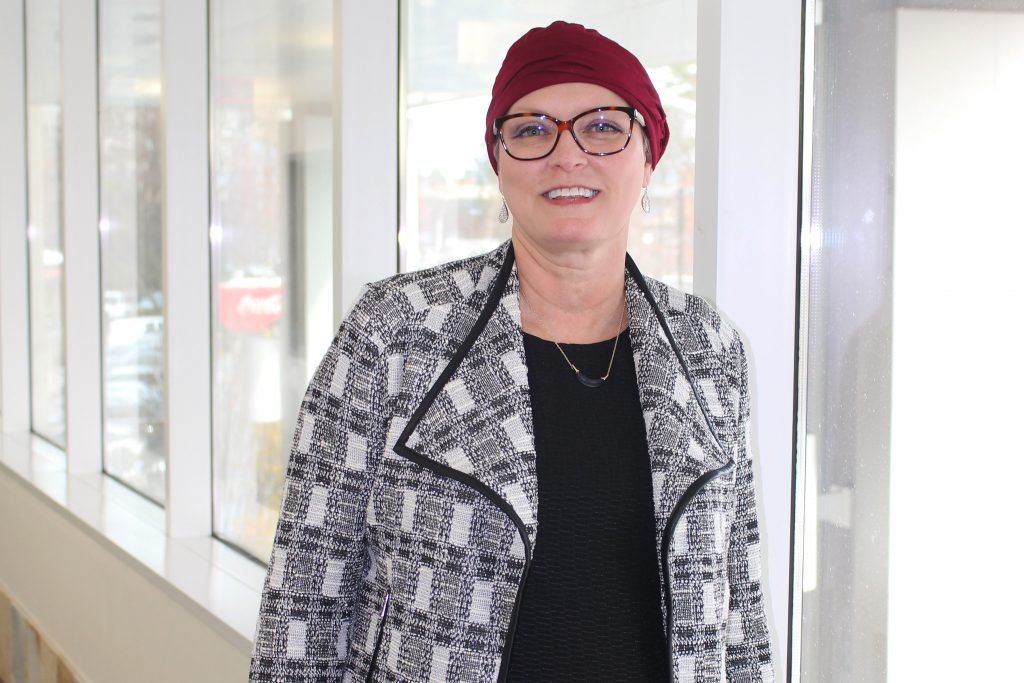
For a seasoned traveler like Anita McAllister, you’d think exploring the mountainous terrain around Machu Picchu was the most memorable and challenging experience of her life. But a breast cancer diagnosis sent her on a new journey, one that has expanded her horizons beyond the mountains of Peru and has given her a new purpose.
A pharmacist with a background in health care consulting, McAllister, 56, was already familiar with the side effects and cautions centered around cancer drugs, but she also came with a patient-centered focus that has served her well as both a patient with cancer and as a patient adviser.
“I’m very vocal because of my career, what I do for a living,” she said. “If I see something that could be different for a valid reason, something that could change because it enhances the patient experience or it enhances quality or productivity, I will point it out.”
Finding the right care team
Her experience as a patient in Florida started off rocky. Her family had just finished cleaning up after Hurricane Irma, a shoulder surgery had been successful, and things were looking up when she got the call from her gynecologist that confirmed lobular carcinoma.
“Any diagnosis of cancer is hard, but just the word ‘cancer;’ it takes your breath away,” she said. “I took a picture of myself, because I wanted to remember how I felt. The good feeling was gone; you start going down the path of worst-case scenario, thinking about what it means.”
Adding insult to injury, she didn’t feel a connection with her doctor. She contacted a colleague, UNC Eshelman School of Pharmacy’s John Valgus, PharmD, BCOP, CPP, assistant director of pharmacy, hematology/oncology, who helped find providers who aligned with her needs. She credits a nurse navigator for her help scheduling initial visits and obtaining all pertinent records from Florida providers.
McAllister said she was fortunate to have the right team, working with UNC Lineberger’s Lisa Carey, MD, the Richardson and Marilyn Jacobs Preyer Distinguished Professor in Breast Cancer Research, David Ollila, MD, and Gaorav Gupta, MD, PhD. After a few months of commuting from Florida, she relocated to Chapel Hill with her husband. She had a complete mastectomy in April, 2018, and upon Valgus’ recommendation and Patient and Family Advisory Council Coordinator Loretta Muss’ blessing, became a patient adviser.
“I like to participate in the community in which I live, and I found a way to do that that satisfies what I need and helps others at the same time,” McAllister said. As a patient adviser, McAllister helps others just like her with questions and concerns they may have about their disease.
Getting involved and making connections
She envisions her role as that of a confidante, offering up advice and sharing her personal experiences so other patients won’t feel like they’re the only ones going through something serious and riding the emotional roller coaster that comes with cancer. McAllister has kept a journal through her entire cancer journey, and said it has helped her deal with everything from reactions to chemotherapy and radiation to how to ease the pain of mouth sores. In the future, she would like to see a “big sister” type program established where patients can reach out to other patients and help them know what to expect.
McAllister said her initial thoughts of “why me” and “what did I do wrong” were misplaced, so she tries to redirect those emotions into more positive outlets. “Channel your anger to incentivize you; channel anger to be positive for you,” she said. “Get involved in exercise, even if it’s just a walk to the mailbox.”
McAllister is putting her money where her mouth is on that front, exercising regularly and training to travel to Patagonia in South America with the same group that went to Machu Picchu. With her free time as she recovers from radiation, she said she’s been learning about the culture and history of the South American region, something she hopes to share with her travel group.
While she often thinks about when she’ll be able to visit some of her favorite destinations out west or indulge her love of baseball, McAllister said she’s trying to do more to live in the moment and said her family has noted she has more patience than she did before her diagnosis.
“No matter how curable it is, it’s still the ‘c word,’” she said. “I’m not going to live with regrets. I try to enjoy the moment more, even if it’s just enjoying the birds. Don’t put off living until you think you can afford it.”
